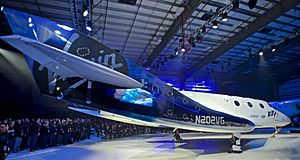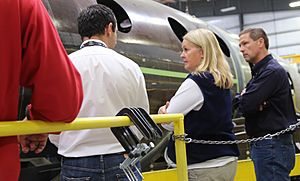VSS Unity facts for kids
Quick facts for kids VSS Unity |
|
|---|---|
 |
|
| Virgin Galactic SpaceShipTwo Unity rollout, 19 February 2016, FAITH hangar, Mojave, California | |
| Type | Scaled Composites Model 339 SpaceShipTwo |
| Manufacturer | The Spaceship Company |
| Construction number | 2 |
| Registration | N202VG |
| First flight |
|
| Owners and operators | Virgin Galactic |
VSS Unity (which stands for Virgin Space Ship Unity) is a special spaceplane that flies using rockets. Its official number is N202VG. Before it was named Unity, some people called it VSS Voyager.
Unity is the second SpaceShipTwo vehicle ever built. It's part of the Virgin Galactic fleet, a company that plans to take people on trips to the edge of space. On December 13, 2018, Unity flew higher than 50 miles (80 kilometers) for the first time.
It's important to know that different groups have different ideas about where space begins. The FAI, which is a group that sets rules for air and space travel, says space starts at the Kármán line. This line is about 62.1 miles (100 km) above Earth.
VSS Unity was first shown to the public on February 19, 2016. After that, it went through many tests on the ground before its first flight on September 8, 2016.
What is VSS Unity?
VSS Unity is the second SpaceShipTwo spaceplane made for Virgin Galactic. It's the first SpaceShipTwo built by The Spaceship Company. The name Unity was announced in February 2016. Before this, it was just called SpaceShipTwo, Serial Number Two.
The famous British scientist Stephen Hawking chose the name Unity. His eye was also used as the model for the eye logo you can see on the side of the spaceplane.
How VSS Unity Was Built
Building Unity started in 2012. Its registration number, N202VG, was set in September 2014. By late 2014, the spaceplane was about 90% finished in terms of its structure.
In May 2015, Unity reached a big step: its body could stand on its own wheels. The spaceship was officially shown to the public on February 19, 2016, just as Virgin Galactic's founder, Sir Richard Branson, had planned. After that, ground and flight tests began.
VSS Unity is the second SpaceShipTwo to be built. The first one, VSS Enterprise, was unfortunately destroyed in a crash in October 2014.
After Unity was shown, it went through a testing phase called "Integrated Vehicle Ground Testing" starting in February 2016. This involved many tests on the ground to make sure everything worked correctly.
Testing Unity in the Air
Unity went through a lot of tests, similar to what VSS Enterprise did. However, because Enterprise had already tested many things, Unity needed fewer tests. For each test flight, a larger aircraft called White Knight Two carries Unity high into the sky.
Testing started with "captive carry flights." This means Unity stayed attached to the White Knight Two. Then, they moved on to "glide flights," where Unity was released and glided back to Earth. Finally, they did "powered test flights," where Unity's rocket engine was fired.
On September 8, 2016, Unity had its first captive-carry flight. More captive-carry flights happened in November 2016.
In 2017, Virgin Galactic said that Unity would start its powered tests soon. The first powered flight test happened on April 5, 2018. During this flight, Unity's rocket fired for 30 seconds, making it go very fast (Mach 1.87) and reach an altitude of about 84,271 feet (25,686 meters). This first powered flight of Unity went higher than any powered test flight of its older sister ship, Enterprise.
VSS Unity VP-03, its first flight into space, happened successfully on December 13, 2018. It went higher than 50 miles (80 km), which NASA and the US Air Force consider the boundary of space.
After its flight in February 2019, VSS Unity was changed to include a cabin for passengers and new displays in the cockpit. Once these changes were done, Unity and its carrier plane, VMS Eve, moved to Spaceport America in New Mexico in February 2020. After two more glide tests in New Mexico, Virgin Galactic showed the inside of the spaceplane to the public in July 2020.
| Flight | Date | Outcome | Top speed | Altitude | Crew |
|---|---|---|---|---|---|
| VSS Unity VP-03 | 13 December 2018 | Success | Mach 2.9 | 82.72 km (51.40 mi) | Mark P. Stucky and Frederick W. Sturckow |
| VSS Unity VF-01 | 22 February 2019 | Success | Mach 3.04 | 89.9 km (55.9 mi) | Dave Mackay, Michael Masucci, and Beth Moses (passenger) |
| VSS Unity VF-02 | 12 December 2020, 16:15 UTC (aborted) | Aborted prior to ignition | ? | ? | Dave Mackay and Frederick W. Sturckow |
| VSS Unity 21 | 22 May 2021, 15:26 UTC | Success | Mach 3 | 89.2 km (55.4 mi) | Dave Mackay and Frederick W. Sturckow |
| VSS Unity 22 | 11 July 2021, 15:04 UTC | Success | Mach 3.2 | 86 km (53 mi) | David Mackay, Michael Masucci, Sirisha Bandla, Colin Bennett, Beth Moses and Richard Branson |
See also
 In Spanish: VSS Unity para niños
In Spanish: VSS Unity para niños
 | Roy Wilkins |
 | John Lewis |
 | Linda Carol Brown |


